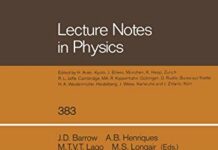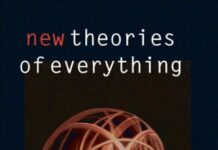
Ebook Info
- Published: 1998
- Number of pages: 296 pages
- Format: PDF
- File Size: 3.70 MB
- Authors: John D. Barrow
Description
John Barrow is increasingly recognized as one of our most elegant and accomplished science writers, a brilliant commentator on cosmology, mathematics, and modern physics. Barrow now tackles the heady topic of impossibility, in perhaps his strongest book yet. Writing with grace and insight, Barrow argues convincingly that there are limits to human discovery, that there are things that are ultimately unknowable, undoable, or unreachable. He first examines the limits on scientific inquiry imposed by the deficiencies of the human mind: our brain evolved to meet the demands of our immediate environment, Barrow notes, and much that lies outside this small circle may also lie outside our understanding. Barrow investigates practical impossibilities, such as those imposed by complexity, uncomputability, or the finiteness of time, space, and resources. Is the universe finite or infinite? Can information be transmitted faster than the speed of light? The book also examines the deeper theoretical restrictions on our ability to know, including Godel’s theorem–which proved that there were things that could not be proved–and Arrow’s Impossibility theorem about democratic voting systems. Finally, having explored the limits imposed on us from without, Barrow considers whether there are limits we should impose upon ourselves. For instance, if the secrets of the atom are to be found only by recreating extreme environments at great financial cost, just how much should we devote to that quest? Weaving together this intriguing tapestry, he illuminates some of the most profound questions of science, from the possibility of time travel to the very structure of the universe.
User’s Reviews
Reviews from Amazon users which were colected at the time this book was published on the website:
⭐This book has become a reference for me in my own search for answers. What I didn’t like about the book is that it felt to me that Mr. Barrow advances many of the same agendas of modern mainstream scientific materialism. But, if one can discriminate somewhat against the latter, the book is chock full of simply explained technical concepts. And, to the degree that Mr. Barrow departs from the mainstream messianic world view of scientific materialism, he does an excellent job of asking some tough questions that are less than flattering to mainstream Science and he proposes some anxious doubts as to humanities ability to overcome some of the “intractable” problems that currently plague the human species. In sum, an educational, informative, and provocative script on the state of modern science and its limits. Lastly I found myself in awe of Mr. Barrows comprehensive awareness of so many of the interdisciplinary branches of science, and his extremely sharp insight and technical abilities with respect to modern science.
⭐The book is looking to limits of knowledge specifically regarding tho origin of universe. Very well done.
⭐Mr Barrow, as always, presents intriguing logical arguments, built upon an original (or at least unusual) view of basic principles.I dont agree with all his conclusions but it was an interesting and provoking read.However, the kindle ebook is awful. The font is ghastly, making some words unreadable (and my kindle touch wont allow font adjustment for this book – but it does for every other one I have!)References are not hyperlinked to the relevant appendix entry (standard on all books I thought?) which in a work that, at times, gets quite involved is a major pain. Diagrams are unintelligible in many cases thanks to the poor quality. Textual errors aboundGet the paperback.
⭐One of the very few books that I would always read several times. The book is a mind challenge of how the human mind will never wither and give in to machines. The ideas are fascinating and a good exercise for the mind.
⭐excellent!
⭐Is science fast coming to an end? Can we arrive at a so-called theory of everything? Are there limits to our abilities to discover the nature of reality?In trying to tackle such questions, Astronomer John D. Barrow invites readers to an intriguing journey which I understood as twofold. First, it promises to show how the notion of impossibility is far subtler than everyday language suggests and to demonstrate how fundamental are the limitations to science (in the broadest sense of human capability to discover and know things). To support this contention, he serves up a menu of what seems like disjointed readings into the limits of human endeavor as demonstrated in findings in different fields such as astronomy, mathematics, psychology, economics, and others. Each of these readings, which are sub-sections of chapters, is individually interesting and the book overall is not deeply technical, — and thus remains accessible to the truly curious generalist reader. It covers some familiar basic ideas in different fields, which all depict the notions of limits and impossibility, whether in scientific discovery or in social decision-making. The topics range from the technical bounds to scientific experiments, such the speed of light and difficulties of producing the extremely high temperatures not found on earth which are needed to test our version of the forces of nature, to Arrow’s impossibility theorem on the inability to generate a consistent ranking of social preferences based on an aggregation of ranking of individual preferences.Unfortunately, these sub-sections of chapters, while individually very interesting and clearly written, tend to conflate different ideas of impossibility rather than leading to a straightforward conclusion on the fundamental limitations of human endeavors of creation and discovery.The secondary thrust of the book is on the nature of reality itself. Barrow argues that the kind of limitations he enumerates defines the universe more powerfully than a list of what we think is possible. In fact, he contends that this ?impossible? nature of the universe is what itself allows the self-reflection consciousness of humans, a rather intriguing, if not entirely novel, proposition.My judgment on this book is a complex as the range of subjects the author attempts to cover. It is without doubt an intriguing set of propositions loosely connected with some related discussion on the history of scientific thought. I found the discussion of nineteenth century notions of impossibility very informative. However, the book may achieve its appeal by overstating its case (QUOTE the astronomers? desire to understand the structure of the universe is doomed merely to scratch the surface of the cosmological problem UNQUOTE) and resorting to fast and loose comparisons of paradoxes and limits which are well-known to practitioners in a number of different fields. Ultimately, the book gives a sense of having covered too much, and thus providing too little in any given area.I confess that notwithstanding these reservations, I enjoyed reading this somewhat unusual book. If you do have the stamina to complete this book, you might choose to do so in a non-linear fashion by working through the clear summaries of each chapter first, and then going through the chapters in your order of preference. If you manage to do all this, you are likely to enjoy another book on a different but related topic on the nature of the human mind entitled ?Figments of Reality? by Stewart and Cohen which I have also reviewed on this site.
⭐går i dybden med et vanskeligt problem, nemlig grænser for viden. Det belyses klart og så selv en gammel læge kan forstå problemet!
Keywords
Free Download Impossibility: The Limits of Science and the Science of Limits in PDF format
Impossibility: The Limits of Science and the Science of Limits PDF Free Download
Download Impossibility: The Limits of Science and the Science of Limits 1998 PDF Free
Impossibility: The Limits of Science and the Science of Limits 1998 PDF Free Download
Download Impossibility: The Limits of Science and the Science of Limits PDF
Free Download Ebook Impossibility: The Limits of Science and the Science of Limits




